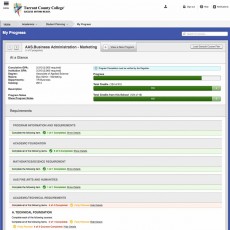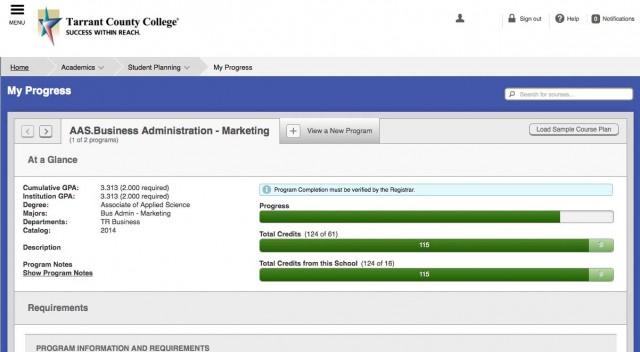By Jamil Oakford/ editor-in-chief

Bogdan Sierra Miranda/The Collegian
TCC will launch an online program next fall that will allow students to actively plan their semester schedules in advance.
With this new technology, students can get a realistic view of how far they are from completing their degree program.
NE student Lauren Johnson thinks this program could have really good use.
“I think that’s actually awesome,” she said. “I’d like to know how many months or how many classes I need to take.”
District officials saw the program demonstrated at several conferences and instantly saw its utility at TCC.
“It’s a way for students to avoid wasting time,” said John Spencer, district registrar and academic support services director. “The state of Texas came out with a ‘60 by 30’ to get schools to focus on this.”
The Texas Higher Education Coordinating Board adopted a plan aiming for 60 percent of Texans to have a postsecondary degree by 2030. This program is one way TCC is trying to assist students with completion.
Spencer pointed out that this program is made for students to begin planning for any future semester at any time.
“The view is that students will have this and will be able to build a schedule prior to registration,” he said.
District student success and online advising director Anthony Walker said this program serves students and advisors alike.
“We’re looking to connect advising to empower that student to take control of their planning,” he said. “That is one of the biggest benefits. The role of the advisor is still the same.”
By February, approximately 70 advisors were trained to work with the online program.
While students can build their schedules for a semester, advisors can still block off course sections and aid students with choosing the appropriate courses to fit their degree plans.
“It’s just an added tool to supplement advising,” Walker said. “It’s going to be a huge advantage to us.”
Walker said that while students are in online advising appointments, advisors can walk through step by step with students and also provide a share-screen feature with the student.
While this will help serve students in the long run, Spencer said this can also help the school with planning.
“From a strategic perspective for the college, it allows us some predictive knowledge for what our course offering should look like,” he said.
This program will be more mobile-friendly as well so that students can access it from a smartphone or tablet at any point they need to. Spencer said degree plans will be far easier to navigate in this program than in WebAdvisor.
“It’s arduous going through it,” Spencer said.
For Johnson, she thinks having a course catalog that she can pick from and move into a schedule will be helpful.
“When the courses are on paper, it’s still not all that clear,” she said. “But I think having a visual like on my phone or on the computer might be more helpful. It’s better to me.”



























